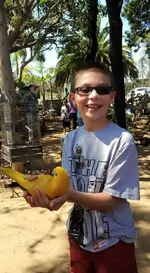Realistically, I figure six is the absolute maximum number of pet birds I could have at once, assuming I'm able to work from home, and four is probably a more realistic number. And I already have two.
I would, however, like to breed birds, which would let me have a lot more birds. If I were breeding birds, I would for the most part like to breed birds which are rare in aviculture not because of low supply but low demand. I'm fairly certain that the palm cockatoos and Queen-of-Bavaria conure will not die out in aviculture, because they're in high demand and fetch high prices. Either they will become more common, or the high prices will keep people breeding them. However I worry about many species dying out in aviculture either because they're a bit more work, they're not as good at cuddling or talking as similar parrots, they're a bit harder to breed, or they're just not as flashy. So while I'd probably start out trying to breed birds which are uncommon but not yet rare in aviculture, like some of the grasskeets, non-Swainson's lories, and Patagonian conures, my goal would ultimately be to focus on rarer species.
Parrots I might get as pets while still in the apartment:
- Iris lorikeet
- Lineolated parakeet
- Pacific parrotlet
- Canary-winged parakeet
- Red-fronted kakariki
- Bourke's parakeet
Parrots I might get if I had a proper house:
- Patagonian conure
- Gold-capped conure
- Peach-fronted conure
- Brown-throated conure
- Red-throated conure
- Slender-billed cockatoo. (This is the only cockatoo I'd be tempted to keep as a housepet, but it would only be feasible if I were working from home and expected to continue to do so indefinitely.)
Lories I might keep in an outdoor aviary, but still as pets:
- Goldie's lorikeet
- Perfect lorikeet
- Dusky lory
- Purple-naped lory
- Black lory
- Marigold lorikeet
Parrots I might try to breed (all of the preceding I might also try to breed, none except the linnies and Bourkes are common)
- Austral conure (I'd love one as a pet too, but they're so rare in aviculture I don't think I can justify it)
- Slender-billed conure
- Any of the Eupsittula spp. conures (except maybe the half-moon)
- Any of the Psittacara spp. conures except the cherry-heads and mitreds.
- Any of the Pyhurra spp. conures except the green-cheek, black-cap, maroon-belly, crimson-belly, and rose-fronted (all of those seem to be common enough I'm not worried about their future in aviculture)
- Any of the non-Pacific parrotlets
- Hawk-headed parrots
- Any Pionus spp. (even the blue-heads aren't all that common)
- Any Poicephalus spp. except maybe Senegals (yes, I know they're super common but Senegals are the one species I might make an exception for.)
- Any lovebirds except the three most common species.
- Any of the grasskeets, but particularly the elegant parakeet
- Any/all of the Polytelis spp. parakeets (Rock pebblers, Princess-of-Wales, Barraband)
- Any lories except Swainson's
- Green and pale-headed rosellas, if they exist in US aviculture
- New Caledonian horned parakeets, if they exist in US aviculture
- Plum-headed and mustached parakeets
- Either species of Vasa
- Gang-gang cockatoos
- Any of the Calyptorhynchus spp. black cockatoos.
- Keas, if they exist in US aviculture
I'm not going to get into what I'd want for softbills in detail, because unlike parrots most softbills are still legal to import, meaning that with a few exceptions (like turacos and toucans) I'm not limited by what's already in aviculture, but could potentially add to it as well if I had the money to spend. If I had a house, I feel like a green aracari, hornbill of any species, and mousebird would be high on my list of priorities, and all are current in aviculture. I could see myself breeding all of those, and turacos, and barbets, and a good number of other softbills as well. In particular, though Nicobar and crowned pigeons aren't really rare in aviculture, they're expensive, and I like them well enough that I'd breed them just to have them. I will note that I'd like to have domesticated poultry though, particularly runner ducks and call ducks.

